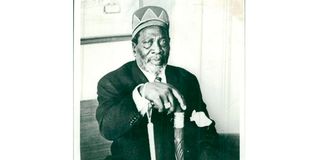Premium
Curriculum on nation building

Kenya's founding president, Mzee Jomo Kenyatta.
The most voluble call at the dawn of independence was that of nation building. Whatever we think of their many faults, some of them congenital, the first generation of Africa’s post-independence leaders knew they had inherited from the European imperialists a deeply flawed political instrumentality.
An incoherent mess, an ogre bent on the consumption of humans – a leviathan for a state. So, they saw their first and most important duty as that of constructing a resilient nation out of the artificial colonial concoction. Most of them failed.
Today, we are no closer to bringing to fruition that lofty and ideal goal. In most African states that goal has been abandoned. We are in despair. What’s to be done?
Take the Horn of Africa, for example, one of the most desperate regions on the planet. The Horn is hell on Earth. There are no more than several sober countries in the region. The rest have spiraled out of control or are mired in interminable crises of self-cannibalisation. Others are simply catastrophes waiting to happen.
We know some of the factors that have led to this sorry state of affairs. An easy one that we often like to blame on our woes is the scandalous international order and its deleterious effects. That’s a given. But other regions also live under the same order and have done better. Which means we need to locate our dysfunction in other places.
I have identified several factors for our woes. All of them start and end with the question of nation building. I call these factors of failure the indexes of despair.
The first is the failure of leadership. I know that we often speak of the central role that civil society and the citizen must play to create a resilient democracy. I totally agree. But citizens as a whole don’t lead a society. What they must do is to produce from among themselves competent and purposeful leaders.
In other words, citizens must geminate an elite that understands its role of leadership and which is able to formulate the irreducible interests of the state and society. This isn’t debatable, or arguable.
Second, the elite must lead in the forging of a national consciousness, a national character that is unique to that state. This zeitgeist differs from one state to another. The character of the United States isn’t the same with that of any other country. This must be true of every country.
A national character doesn’t grow out of nothing. It’s a nationally conscious, deliberate, and ideological process. At some point the character acquires spontaneity and becomes rote. It becomes so ingrained in the national psyche that it passes the test of obviousness without much rigour. Thus when we ask what, or who, is a Kenyan we instantly know what it is. It’s like bad food – you know it when you see, or taste, it.
Third, we need to deliberately inculcate in our citizens and institutions that national character or zeitgeist. I am not suggesting that we establish a Ministry of National Guidance for that would Orwelian.
But I strongly believe that we must instill in our society the values that matter to citizens. We need, if you will, a curriculum of nation building. I mean a living, breathing compendium of Kenya’s basic interests and its character that we must instill in our children.
For example, the leaders in our educational system are obsessed with STEM subjects – which are absolutely essential – but an automaton who is a math genius or an engineer without any sense of the nation is an empty husk of a citizen.
We need to reexamine the roles of two institutions that the 2010 Constitution established. Both should play critical roles in nation building, but don’t. The first is the Senate which is supposed to protect devolution and enhance development as a tool of creating an equal society.
By every index of measurement, the Senate has failed to rise to the challenge. Instead, it’s mired in petty pursuits devoid of the national project. My view is that the chamber needs to be abolished.
The other empty husk is the National Cohesion and Integration Commission. Can anyone point to a single achievement of the NCIC? It is one of the many toothless institutions that gobble up national resources without any benefit.
Finally, I want to ask our leaders to return the national conversation to a more innocent era when we dreamt of being a single nation, diverse, but united in a common purpose. While I agree that much of that talk was empty and devoid of sincerity, it at least kept the project of nation building in discussion.
Today, many of our senior leaders are embroiled in empty braggadocio. They say the most outrageous things without consequence. They mock the people they serve with impunity. They openly advocate for ethnic exclusivism and bigotry. That’s how states collapse.
- Makau Mutua is SUNY Distinguished Professor and Margaret W. Wong Professor at Buffalo Law School, The State University of New York. @makaumutua.




